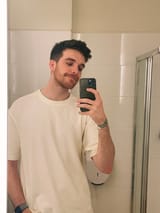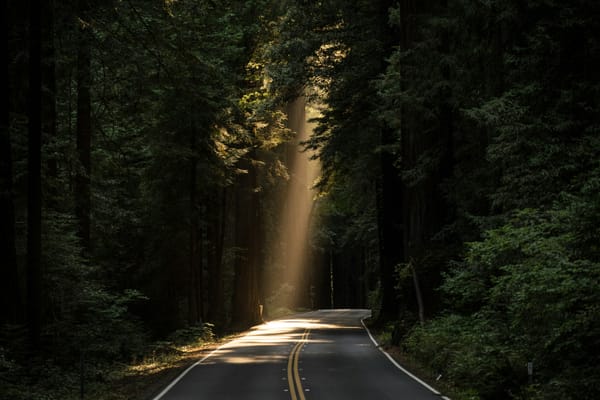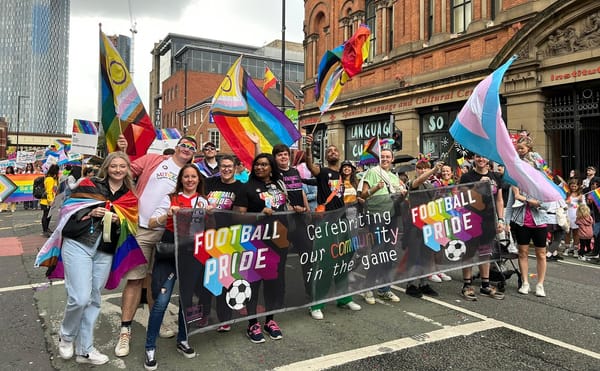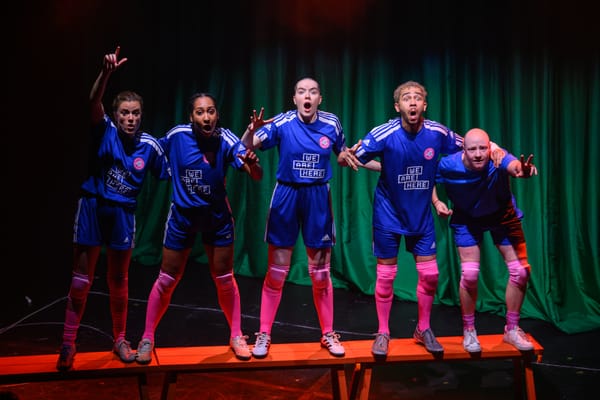What helping run a mixed-gender LGBTQ+ football club taught me
"Cardiff Dragons has helped me work out who I am."
What's it like to help run a mixed-gender LGBTQ+ football team? What does it teach you about yourself? Charlotte is chairperson of the Cardiff Dragons, a mixed-gender LGBTQ+ football club. They explore how football and the Dragons have helped them on their journey to understanding their own identity.
Today is Trans Day of Visibility, a day to celebrate trans and non-binary people. As trans and non-binary people continue to face horrific discrimination, violence, and exclusion, take time today to show your support for the community.
And as always, if you like this article, please share it.
Adam
By Charlotte Galloway
I’ve experienced not an insignificant amount of something like impostor syndrome when it comes to my own identity.
I feel like I can relate to most people at Cardiff Dragons in some form or other but as someone born female with a partner born male, and we both look cis, I’ve also felt like something of a fraudulent queer.
Sometimes as the chairperson of an LGBT football club, this has made me feel like an imposter. I’m not a lesbian or someone wanting to medically transition. We all know there’s a B in LGBT. But it’s only within the last year or so that I’ve really felt like I belong. It’s only recently I’ve started giving the B in LGBT as much respect to its independence as I’ve given the other three letters – only when it comes to myself though, not when it comes to other bisexual people.
I came out to myself as bisexual around 6 years ago. I had been with my current partner for a few months. He’s a queer man, and I met him at the Dragons. I remember when I joined the club (identifying as a cis, straight person) we were both attracted to each other but both assumed the other were gay, so didn’t say anything acknowledging our attraction for a few months. Eventually, though, we did and some time after this we fell into a relationship.
For the first time in my life I was with someone who was queer – and openly so. This allowed me to explore and express myself – first my sexuality, and then my gender identity.
I was in my ‘coming out’ phase and I needed a label. Was I bisexual or pansexual? Agender? Neutrois? Eventually, I settled for queer.
A couple of years after this, the non-binary label became more mainstream, and as someone who’s never felt like ‘one of the girls’ this seemed like a natural tag that I could give other people to help them understand my gender – insofar as I didn’t feel cis nor the need to medically transition to be ‘more male’.
As a child at Christmas, I’d wake up wishing that Father Christmas had made me a boy, I also have my own experiences of dysphoria.
This dysphoria isn’t constant, but it has been there since I was a child. That fact shows me that it’s something that’s come from within me, and from a very pure place, rather than being influenced by what and who I saw around me. This dysphoria isn’t constant, but it has been there since I was a child.
It’s only recently, however, that I’ve come to embrace and own being bisexual. For a long time, I felt the need to ‘prove’ my bisexuality. I had to love The L Word and RuPaul’s Drag Race. Am I a bad queer to say I just don’t enjoy drag shows and burlesque?
Alongside the feelings of being an imposter, I also felt as though being ‘a bit gay’ and ‘a bit trans’ meant I could relate to a lot of the people at Cardiff Dragons, but also that my cis-het passing privilege gave me relatively more energy to be able to take on the role of chairperson.
Despite my queer journey, it’s idealistic and dishonest to pretend that I always feel comfortable in every queer environment. As someone who’s not overly femme presenting, I don’t feel comfortable in high femme dominated spaces – mainly because I feel like an alien. This is something I’d like to work on.
When I joined the Dragons, I didn’t even realise it was an LGBT club. A friend from uni asked if I wanted to come along to training, as she knew I liked football, so in January 2016 I went along for my first training session, assuming it was just another football club.
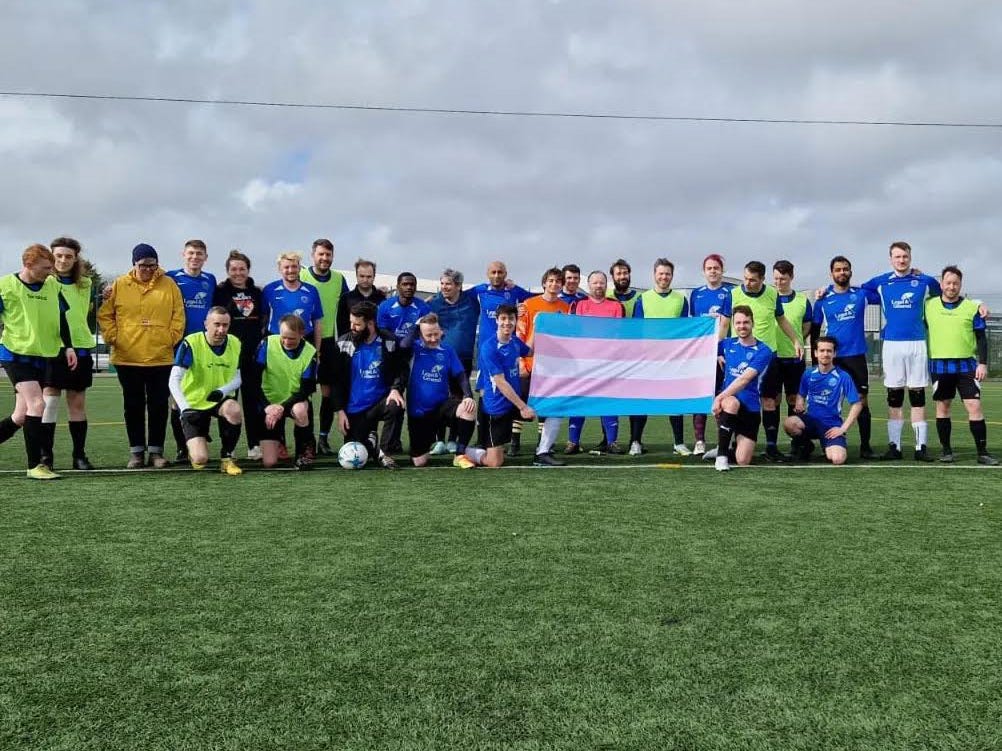
I was immediately struck by the casual and fun atmosphere – people still put effort in during drills and matches, but coaches and managers never shouted at their players. I’ve played football since I was around 7 or 8 years old, and almost every year there was a standard you had to meet to get any playing time. Not so at the Dragons. There were complete beginners right through to experienced players.
The club has two main teams: a 7-a-side non-binary and women’s team (trans inclusive, of course) that plays in the Bristol and Cardiff women’s casual leagues, and an open to all-gender 11 a side team that plays in the GFSN league and Cardiff casual league and is mostly dominated by cis men. There’s also a 5-a-side team that is open to all genders. When I joined, we sometimes trained split by gender (as per the two teams at the club) and sometimes mixed all together.
I have fond memories of my first year at the club, rarely more than 20 of us all mixed together playing a 9 or 10 or 11 a side match, 5 ft 2 cis women tackling 6 ft tall cis men, people in their 40s scoring screamers from 30 yards out… and everyone had their fair share of poor first touches and scuffed shots. It was joyful chaos. It still is. But I hope we’re a bit better at football now.
One day, a trans player turned to me during a session and said excitedly ‘I came out at work today!’. As someone who grew up in Surrey (where there wasn’t much diversity, to put it mildly) I was shocked. It somehow hadn’t occurred to me that this woman that I knew was living a whole other identity, dressing differently, and using another name outside of our training sessions. As someone who was only just figuring out my own identity, this was a massive learning point for me on how different each of our coming out stories can look.
After my first couple of years, I explored playing for other women’s teams in and around Cardiff. I spent a couple of years playing in the Welsh leagues, but by February 2020, just before the pandemic reached Wales, I realised I wasn’t looking forward to training with the club I was at.
I’d heard transphobic conversations during warm ups, and there was a social hierarchy I didn’t quite understand. I just wanted to turn up and play football.
Training night for the team I was playing for was on the same night as for the Dragons. One week, when I realised I just wasn’t looking forward to going to my competitive club’s training sessions, I went to the Dragons.
I hope that how I felt later that night never leaves me.
I left Dragons training feeling like I’d come home.
There were some familiar faces, and many new faces since I’d last been to a session two years prior, but the attitude and atmosphere were the same. There was no judgement, no treating someone differently because of their ability or their identity. We were all different and that united us.
Soon after, Covid hit, but I knew where I wanted to play my football now. I’d had a go at ‘more serious’ football, and at a time when my career was moving pretty quickly, I knew I didn’t have the energy to turn up week in, week out and give up most of my weekends as I had done for much of my teenage years.
Since seeing, feeling, living women’s football in Wales, I have more passion to do my part to help everyone feel how I know this club can make people feel. Don’t get me wrong – there have been tough times. When you have marginalised people all together within the same club, within the same team, some people naturally want more than others.
Some want to be more competitive than others – and that’s ok.
We’ve had two instances where a significant number of people have left and created their own team – and that’s ok!
I’ve learnt it’s impossible to be inclusive and please everyone. Being an inclusive club means that everyone is welcome, regardless of identity or ability, with the one requirement being that they are respectful and welcoming and genuine to all others there.
It’s not plain sailing, chairing a mixed gender football club to people from the ages of 18 to nearly 60.
One particular beast that continues to rear its head is that of large, nationally known media outlets approaching the club to feature in their LGBT History month feature or Pride month piece. In my first year of being chairperson, we found ourselves torn between appearing on Football Focus and boycotting the media entirely due to anti-trans narratives. As a result, we now have an unwritten policy of training sessions only being filmed if they are put on separately to the usual sessions.
Members and supporters also ask before taking photos and videos with the intent of them going on social media, as we have players who are not out and who don’t feel comfortable with a camera being around.
I’ve learnt that the football pitch is where I feel most comfortable, I feel like I fit in most there. Maybe it’s that people communicate and connect through how they play, not how they present.
When I go home and see my parents, I tell them how well football is going and it’s all very superficial. My parents know that Cardiff Dragons is a club built to provide football for LGBT people and anyone else that feels like they don’t belong in conventional Sunday league set-ups, but they don’t ask me about myself, about my identity. They see their daughter is in a relationship with a man and dismiss, or hide, their confusion about why we’re both so passionate about Wales’ first LGBT football club.
But Cardiff Dragons has helped me work out who I am and expand into that space. I’m so grateful for that.
I have no doubt that if I were still in a conventional football club, I wouldn’t be ‘out’. I’d probably be in a cis-het relationship, angry and confused as to why I kept being attracted to women, and tired of boyfriends making disparaging remarks about my refusal to conform to conventional standards of femininity.
Before the Dragons, that’s how it was. I had a boyfriend asking me not to wear a particular pair of shoes because they ‘de-feminised’ me. I had a boyfriend telling me to ‘ease off the steroids’ when I’d come back from lifting weights at the gym. I had boyfriends making jealous comments when they thought they saw me looking at other men, but never noticing that I would also look at women.
Cardiff Dragons has helped me embrace who I am, and learn what it feels like for other people who see me, a person in a position of authority, embrace them for who they are rather than usher them into a box of who they should be. My identity as a non-binary bisexual is joyful chaos – and I love it.
Thank you for reading Out and Out Football. Will you share Charlotte’s post with your friends?
